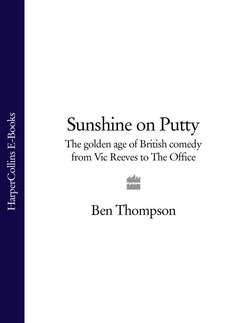Читать книгу Sunshine on Putty: The Golden Age of British Comedy from Vic Reeves to The Office - Ben Thompson, Ben Thompson - Страница 38
Four
Оглавление‘He lays himself on the line, and we’re not much used to that sort of honesty’
Sean Hughes tour programme, January 1994
There is an armchair centre-stage at Brighton’s Dome Theatre, as Sean Hughes begins a tour that will last the best part of three months. But Hughes – a rheumy-eyed Stan Laurel lookalike with an appealing London-Irish brogue – rarely sits in it, preferring to pace back and forth like an expectant father who would rather not have kept the baby.
His coat-hanger frame is slightly bent, as if his chin were glued to his left shoulder. His jokes have a twist in them, too – turning back to have a gentle smirk at themselves before the punchline is even out of sight. ‘I’m buying a house at the moment so I’ve just had a survey done: 80 per cent of people said I should go ahead’ is a line Steve Martin would not have kicked out of bed at his late-seventies peak.
As Sean forsakes the amiable Garry Shandling-inspired metatextual footling of his Sean’s Show television series for a bombardment of quick-fire gags in the style of Frank Carson, the odd cheap shot does get through. (Why waste time trying to wring laughs out of Linford Christie’s genitalia when you could just as easily join the BNP?)
Hughes’s return to comedy basics must be doubly surprising to anyone devoted enough to have stumped up five pounds for the programme, which presents him as a cardigan-clad visionary of our era. It describes Sean’s battles with Catholicism and his search for his true identity, culminating in a change of name (from John, which is not all that far from Sean, when you stop to think about it). ‘He lays himself on the line,’ apparently, ‘and we’re not much used to that sort of honesty.’
Poetry is a new direction for Sean and, judging by the reception accorded to his recent book The Grey Area – which has sold 20,000 copies in hardback alone – a successful one. But that doesn’t mean he is any good at it. In fact, as a writer of verse (and later prose), Sean Hughes has a seemingly unattainable ambition: to make Sandi Toksvig look like a significant literary figure.
How can someone be so perceptive one minute and so totally blind to their own limitations the next? In the broader show-business world, this is known as the Clive James Conundrum.
Taking yourself too seriously is a common flaw among comedians. It only becomes a real problem when it makes you hate your audience. Hughes once threatened to play over-eighteens’ venues only – on tonight’s evidence, he would need to book a bus shelter if he did – and yet at this point seems to maintain an easy, avuncular rapport with his much younger fans.
There’s no reason why he shouldn’t, either, as teenage self-absorption is his major comic staple anyway.69 And the extension of adolescence from a seven- to a twenty-year span which mysteriously takes place at some point around the turn of the decade70 only renders Hughes’s distinctive brand of late-twenties bachelor angst (‘How am I ever going to have a kid when I still wake up in the foetal position?’) all the more à la mode.
A year or so later at the London Comedy Festival, however, things seem to have gone a bit sour. Hughes looks increasingly uncomfortable with the tender years of his constituency. His attitude at times seems almost disdainful, as he veers uneasily between talking down to his audience (heaven preserve us from bad impersonations of Damon Albarn – the real thing is difficult enough to cope with) and going wilfully over their heads. One Winston Churchill and Nancy Astor reference is so reluctant to give itself up that a passing police detective inspector has to be called in to talk it down off the roof.
What makes Hughes’s increasingly compulsive underachievement so frustrating is that at his funniest – dissecting dysfunctional family relationships or Dublin lounge décor, for example – he is a truly challenging performer. He has a real talent for undermining the assumptions of shared experience on which so much second-rate comedy is based. ‘Did you ever do that thing’, he asks at one point, in the casual vernacular of a thousand arrested-adolescence nostalgia gags, ‘of feigning serious injury when your dad hit you?’
In happy contrast to Hughes’s ever grouchier generational rank-pulling, Lee and Herring – the mid-nineties’ fifth-form (or even year 10) comedians of choice – prefer to make the most of the youth and supposed impressionability of their target audience.71 In the course of three series of their Fist of Fun Radio 1 show (one of the few artistic successes of the early years of Matthew Bannister’s regime at what was then Britain’s most-listened-to radio station),72 this mischievous double act develop a uniquely participatory style of comedy which involves mobilizing listeners en masse to scour the UK for the charity event that raises the least money.
‘The Lee and Herring child army’ – Fist of Fun’s core audience of young people with time on their hands – are also encouraged to deluge unsuspecting local radio personalities with sacks of motiveless fan mail. So how do the twenty-seven-year-old generals of this deadly teenage guerilla force think their footsoldiers feel about them?
‘We’ve got some stalwart fans who are impressed by us,’ insists Richard Herring proudly, ‘but not all that many of them…Mostly, we send people stuff we’ve got lying around in the office and they write back in a slightly ironic way and say, “Oh thanks – I’ve got a piece of rubbish that you’ve touched”.’
